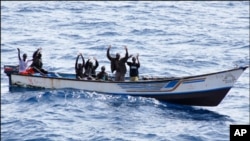U.S. Assistant Secretary of State for Political-Military Affairs Andrew Shapiro recently testified before the U.S. Congress about the problem and approach to combating piracy on the high seas.
"Piracy off the coast of Somalia is a crime of growing global concern," Assistant Secretary Shapiro said. "Heavily-armed pirates board unarmed vessels and seize the ship, cargo and crew for ransom. . . A vicious cycle has formed where ever-rising ransom payments have not just spurred additional pirate activity, but have also enabled pirates to increase their operational capabilities and sophistication."
In 2010, Somali pirates captured over 1,000 sailors aboard 49 vessels. As of June 21, 390 seafarers were being held as hostages, and 17 hijacked ships were being held for ransom. Piracy has become more organized, more violent and has expanded to cover an increasingly large geographic area, from the southern Red Sea to the eastern Indian Ocean. Somali pirates now operate in a total sea space of approximately 2.5 million square nautical miles, an increase from approximately 1 million square nautical miles two years ago.
In response, the United States has taken the lead in pursuing a multilateral and multidimensional approach to combating piracy emanating from the coast of Somalia.
"In January 2009, we helped establish the Contact Group on Piracy off the Coast of Somalia, which now includes nearly 70 nations, international organizations, and maritime trade associations, to help coordinate national and international counter-piracy policies and actions," Assistant Secretary Shapiro said. "The United States [also] established Combined Task Force 151 -- a multinational task force charged with conducting counter-piracy naval patrols in the Gulf of Aden and off the eastern coast of Somalia, covering an area of more than one million square miles."
In addition, NATO is engaging in Operation Ocean Shield, the European Union has Operation ATALANTA, and other national navies are also conducting counter-piracy patrols. On any given day up to 30 vessels from as many as 20 nations are engaged in counter-piracy operations in the region, including China, India and Japan.
With a multilateral framework in place, the United States is pursuing a multi-dimensional approach that focuses on security – through the projection of military power to defend commercial and private vessels; on prevention – through encouraging the private sector to adopt self-protection measures; and deterrence – through effective prosecution and incarceration.




